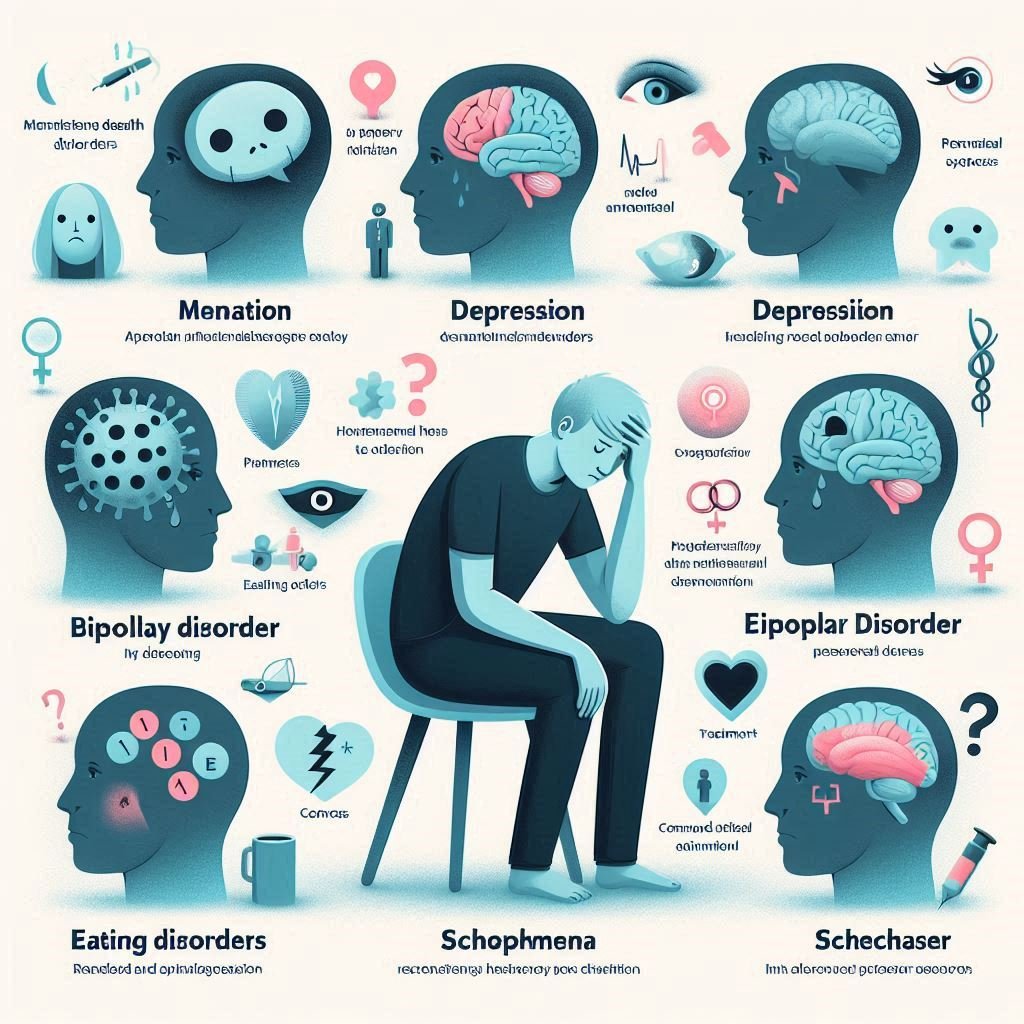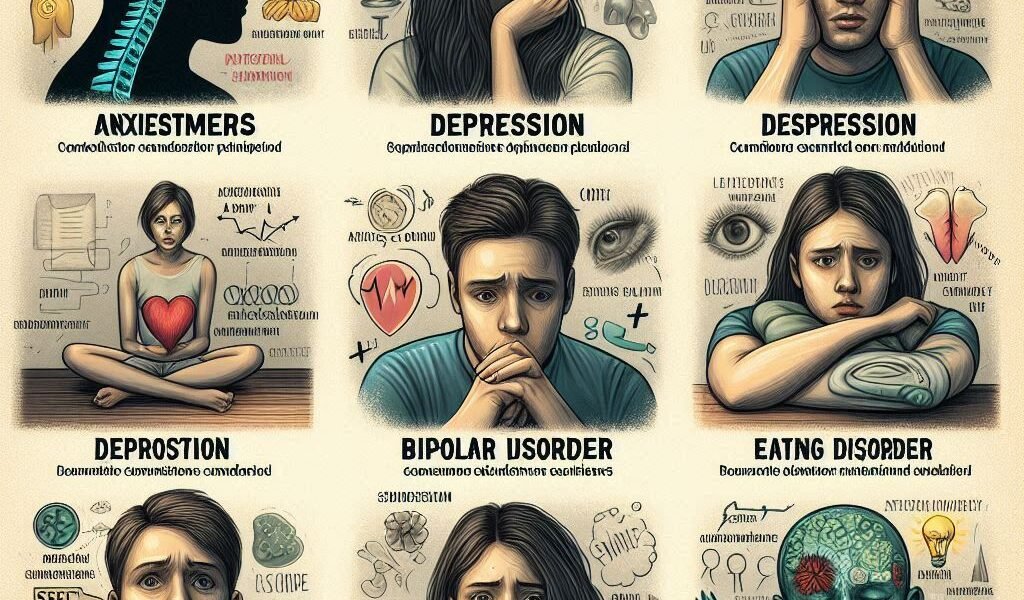Mental health is an essential part of our overall well-being, yet it’s often overlooked or misunderstood. Mental health disorders affect millions of people around the world, but many don’t fully understand what these disorders entail or how to recognize them. Understanding common mental health disorders is the first step toward reducing stigma and promoting better mental health for everyone. In this post, we will explore several common mental health disorders, their symptoms, causes, and treatment options to help raise awareness and foster understanding.
What Are Mental Health Disorders?
Mental health disorders, also known as mental illnesses, are conditions that affect a person’s thoughts, emotions, behavior, and overall mental functioning. These disorders can vary in severity, from temporary struggles to long-term challenges, and can affect anyone, regardless of age, gender, or background.
Common mental health disorders include anxiety disorders, depression, bipolar disorder, eating disorders, and schizophrenia. Each of these conditions affects people differently, but they all impact the ability to function in everyday life. Understanding these disorders is crucial in providing support and seeking appropriate treatment.
1. Anxiety Disorders
Anxiety is a normal part of life, especially when we face stressful situations. However, when anxiety becomes persistent, overwhelming, and interferes with daily activities, it may be indicative of an anxiety disorder. There are several types of anxiety disorders, including generalized anxiety disorder (GAD), social anxiety disorder, and panic disorder.
Symptoms of Anxiety Disorders:
- Constant worry or fear
- Restlessness or feeling on edge
- Difficulty concentrating
- Physical symptoms like rapid heart rate, sweating, and shaking
Treatment Options:
- Cognitive Behavioral Therapy (CBT): A type of therapy that helps people change negative thought patterns and behaviors that contribute to anxiety.
- Medication: Antidepressants or anti-anxiety medications may be prescribed to help manage symptoms.
- Lifestyle changes: Regular exercise, a healthy diet, and mindfulness practices like meditation can help reduce anxiety.
Why It’s Important: Understanding the symptoms of anxiety disorders is key to recognizing when help is needed. Early intervention can significantly improve quality of life.
2. Depression
Depression is more than just feeling sad—it’s a persistent feeling of hopelessness and despair that can impact every aspect of life, from work to relationships to physical health. Major depressive disorder (MDD) is the most common type of depression.
Symptoms of Depression:
- Persistent sadness or low mood
- Loss of interest in activities once enjoyed
- Changes in appetite and sleep patterns
- Difficulty concentrating and making decisions
- Thoughts of death or suicide
Treatment Options:
- Therapy: Cognitive Behavioral Therapy (CBT) and other forms of psychotherapy are highly effective in treating depression.
- Medication: Antidepressants, such as selective serotonin reuptake inhibitors (SSRIs), are often used to help balance chemicals in the brain.
- Lifestyle changes: Regular exercise, a balanced diet, and good sleep hygiene can help improve mood and reduce symptoms of depression.
Why It’s Important: Depression is a leading cause of disability worldwide. Understanding it as a serious medical condition, not just a “bad mood,” is essential for encouraging treatment and support.
3. Bipolar Disorder
Bipolar disorder is characterized by extreme mood swings that include emotional highs (mania or hypomania) and lows (depression). These shifts can disrupt relationships, work, and everyday life.
Symptoms of Bipolar Disorder:
- Manic phase: Elevated mood, increased energy, racing thoughts, impulsivity, and a decreased need for sleep.
- Depressive phase: Persistent sadness, low energy, hopelessness, and feelings of worthlessness.
- Cycling moods: These shifts can last from days to months, depending on the individual.
Treatment Options:
- Medication: Mood stabilizers, antipsychotics, and antidepressants are commonly prescribed to help manage symptoms.
- Therapy: Psychotherapy, including CBT, can help individuals manage their moods and improve coping strategies.
- Lifestyle management: Regular sleep patterns, stress management, and a routine can help prevent mood swings.
Why It’s Important: Bipolar disorder often goes undiagnosed because symptoms can overlap with other conditions, like depression. Early diagnosis and treatment are crucial for managing the condition.

4. Eating Disorders
Eating disorders, such as anorexia nervosa, bulimia nervosa, and binge eating disorder, involve extreme behaviors related to food, eating, and body image. These disorders can severely impact physical and mental health.
Symptoms of Eating Disorders:
- Restrictive eating or excessive dieting
- Compulsive overeating or bingeing
- Extreme concern with body weight or shape
- Distorted self-image
- Physical signs, such as extreme weight loss, fatigue, or digestive problems
Treatment Options:
- Therapy: Cognitive Behavioral Therapy (CBT) and family-based therapy are commonly used to address the underlying causes of eating disorders.
- Nutritional counseling: A registered dietitian can help individuals develop healthier eating habits and restore proper nutrition.
- Medication: Antidepressants or other medications may be used to treat co-occurring conditions like anxiety or depression.
Why It’s Important: Eating disorders have the highest mortality rate of any mental health disorder. Understanding the complexities of these disorders is key to offering effective support and treatment.
5. Schizophrenia
Schizophrenia is a chronic and severe mental health disorder that affects a person’s thoughts, feelings, and behaviors. People with schizophrenia may have difficulty distinguishing reality from delusions or hallucinations.
Symptoms of Schizophrenia:
- Delusions (false beliefs)
- Hallucinations (seeing or hearing things that aren’t there)
- Disorganized thinking or speech
- Social withdrawal or lack of motivation
- Difficulty functioning in daily life
Treatment Options:
- Medication: Antipsychotic medications are used to manage symptoms of schizophrenia, often in combination with therapy.
- Therapy: Psychosocial therapy can help individuals manage symptoms and improve social and vocational skills.
- Community support: Long-term care and support from loved ones are essential for helping individuals with schizophrenia maintain stability.
Why It’s Important: Schizophrenia is often misunderstood and can lead to significant isolation. With proper treatment and support, individuals with schizophrenia can lead fulfilling lives.
Conclusion
Understanding common mental health disorders is crucial for breaking the stigma surrounding mental illness and promoting better mental health for all. Each of these disorders—whether it’s anxiety, depression, bipolar disorder, eating disorders, or schizophrenia—affects people in different ways. However, with proper treatment and support, individuals can manage symptoms and lead fulfilling lives. It’s essential for us to recognize the signs, offer support, and encourage those struggling with mental health issues to seek help. Mental health is just as important as physical health, and everyone deserves the opportunity to live a healthy, balanced life.








No Comments